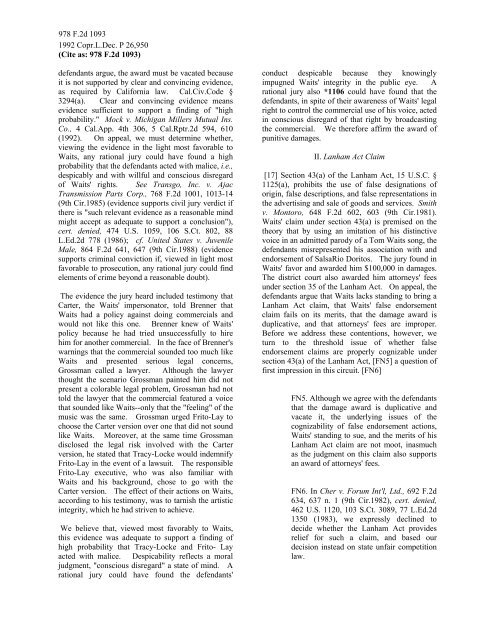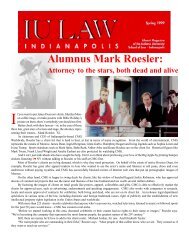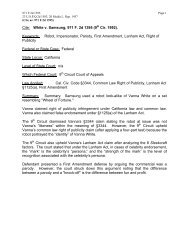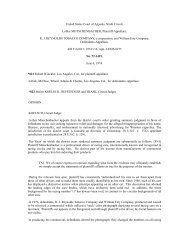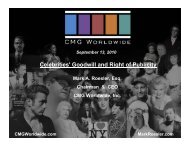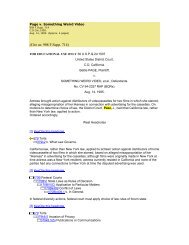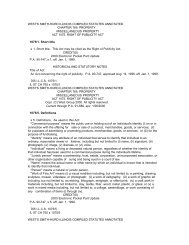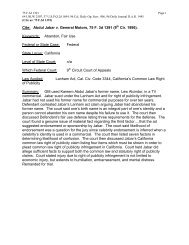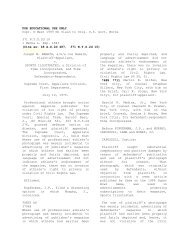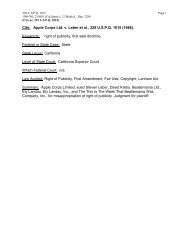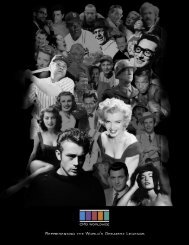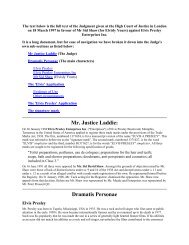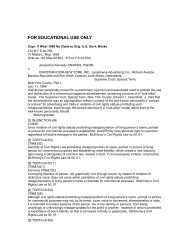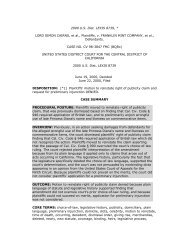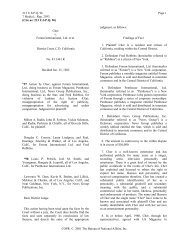Cite: Waits v. Frito Lay, 978 F. 2d 1093 (9th Cir. 1992 ... - Mark Roesler
Cite: Waits v. Frito Lay, 978 F. 2d 1093 (9th Cir. 1992 ... - Mark Roesler
Cite: Waits v. Frito Lay, 978 F. 2d 1093 (9th Cir. 1992 ... - Mark Roesler
You also want an ePaper? Increase the reach of your titles
YUMPU automatically turns print PDFs into web optimized ePapers that Google loves.
<strong>978</strong> F.<strong>2d</strong> <strong>1093</strong><br />
<strong>1992</strong> Copr.L.Dec. P 26,950<br />
(<strong>Cite</strong> as: <strong>978</strong> F.<strong>2d</strong> <strong>1093</strong>)<br />
defendants argue, the award must be vacated because<br />
it is not supported by clear and convincing evidence,<br />
as required by California law. Cal.Civ.Code §<br />
3294(a). Clear and convincing evidence means<br />
evidence sufficient to support a finding of "high<br />
probability." Mock v. Michigan Millers Mutual Ins.<br />
Co., 4 Cal.App. 4th 306, 5 Cal.Rptr.<strong>2d</strong> 594, 610<br />
(<strong>1992</strong>). On appeal, we must determine whether,<br />
viewing the evidence in the light most favorable to<br />
<strong>Waits</strong>, any rational jury could have found a high<br />
probability that the defendants acted with malice, i.e.,<br />
despicably and with willful and conscious disregard<br />
of <strong>Waits</strong>' rights. See Transgo, Inc. v. Ajac<br />
Transmission Parts Corp., 768 F.<strong>2d</strong> 1001, 1013-14<br />
(<strong>9th</strong> <strong>Cir</strong>.1985) (evidence supports civil jury verdict if<br />
there is "such relevant evidence as a reasonable mind<br />
might accept as adequate to support a conclusion"),<br />
cert. denied, 474 U.S. 1059, 106 S.Ct. 802, 88<br />
L.Ed.<strong>2d</strong> 778 (1986); cf. United States v. Juvenile<br />
Male, 864 F.<strong>2d</strong> 641, 647 (<strong>9th</strong> <strong>Cir</strong>.1988) (evidence<br />
supports criminal conviction if, viewed in light most<br />
favorable to prosecution, any rational jury could find<br />
elements of crime beyond a reasonable doubt).<br />
The evidence the jury heard included testimony that<br />
Carter, the <strong>Waits</strong>' impersonator, told Brenner that<br />
<strong>Waits</strong> had a policy against doing commercials and<br />
would not like this one. Brenner knew of <strong>Waits</strong>'<br />
policy because he had tried unsuccessfully to hire<br />
him for another commercial. In the face of Brenner's<br />
warnings that the commercial sounded too much like<br />
<strong>Waits</strong> and presented serious legal concerns,<br />
Grossman called a lawyer. Although the lawyer<br />
thought the scenario Grossman painted him did not<br />
present a colorable legal problem, Grossman had not<br />
told the lawyer that the commercial featured a voice<br />
that sounded like <strong>Waits</strong>--only that the "feeling" of the<br />
music was the same. Grossman urged <strong>Frito</strong>-<strong>Lay</strong> to<br />
choose the Carter version over one that did not sound<br />
like <strong>Waits</strong>. Moreover, at the same time Grossman<br />
disclosed the legal risk involved with the Carter<br />
version, he stated that Tracy-Locke would indemnify<br />
<strong>Frito</strong>-<strong>Lay</strong> in the event of a lawsuit. The responsible<br />
<strong>Frito</strong>-<strong>Lay</strong> executive, who was also familiar with<br />
<strong>Waits</strong> and his background, chose to go with the<br />
Carter version. The effect of their actions on <strong>Waits</strong>,<br />
according to his testimony, was to tarnish the artistic<br />
integrity, which he had striven to achieve.<br />
We believe that, viewed most favorably to <strong>Waits</strong>,<br />
this evidence was adequate to support a finding of<br />
high probability that Tracy-Locke and <strong>Frito</strong>- <strong>Lay</strong><br />
acted with malice. Despicability reflects a moral<br />
judgment, "conscious disregard" a state of mind. A<br />
rational jury could have found the defendants'<br />
conduct despicable because they knowingly<br />
impugned <strong>Waits</strong>' integrity in the public eye. A<br />
rational jury also *1106 could have found that the<br />
defendants, in spite of their awareness of <strong>Waits</strong>' legal<br />
right to control the commercial use of his voice, acted<br />
in conscious disregard of that right by broadcasting<br />
the commercial. We therefore affirm the award of<br />
punitive damages.<br />
II. Lanham Act Claim<br />
[17] Section 43(a) of the Lanham Act, 15 U.S.C. §<br />
1125(a), prohibits the use of false designations of<br />
origin, false descriptions, and false representations in<br />
the advertising and sale of goods and services. Smith<br />
v. Montoro, 648 F.<strong>2d</strong> 602, 603 (<strong>9th</strong> <strong>Cir</strong>.1981).<br />
<strong>Waits</strong>' claim under section 43(a) is premised on the<br />
theory that by using an imitation of his distinctive<br />
voice in an admitted parody of a Tom <strong>Waits</strong> song, the<br />
defendants misrepresented his association with and<br />
endorsement of SalsaRio Doritos. The jury found in<br />
<strong>Waits</strong>' favor and awarded him $100,000 in damages.<br />
The district court also awarded him attorneys' fees<br />
under section 35 of the Lanham Act. On appeal, the<br />
defendants argue that <strong>Waits</strong> lacks standing to bring a<br />
Lanham Act claim, that <strong>Waits</strong>' false endorsement<br />
claim fails on its merits, that the damage award is<br />
duplicative, and that attorneys' fees are improper.<br />
Before we address these contentions, however, we<br />
turn to the threshold issue of whether false<br />
endorsement claims are properly cognizable under<br />
section 43(a) of the Lanham Act, [FN5] a question of<br />
first impression in this circuit. [FN6]<br />
FN5. Although we agree with the defendants<br />
that the damage award is duplicative and<br />
vacate it, the underlying issues of the<br />
cognizability of false endorsement actions,<br />
<strong>Waits</strong>' standing to sue, and the merits of his<br />
Lanham Act claim are not moot, inasmuch<br />
as the judgment on this claim also supports<br />
an award of attorneys' fees.<br />
FN6. In Cher v. Forum Int'l, Ltd., 692 F.<strong>2d</strong><br />
634, 637 n. 1 (<strong>9th</strong> <strong>Cir</strong>.1982), cert. denied,<br />
462 U.S. 1120, 103 S.Ct. 3089, 77 L.Ed.<strong>2d</strong><br />
1350 (1983), we expressly declined to<br />
decide whether the Lanham Act provides<br />
relief for such a claim, and based our<br />
decision instead on state unfair competition<br />
law.


